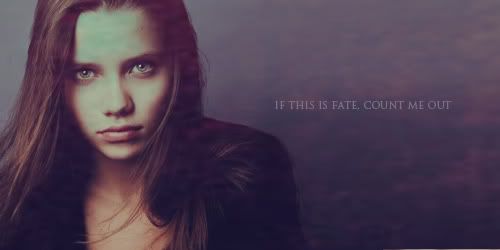Post by julianna sellenger on Jul 6, 2010 8:43:01 GMT -8
julianna paige sellenger


[/size]
name: Katja
age: nearly nineteen
gender: female
writing experience: Counting childish stories and poems, fourteen years. I’ve been roleplaying for about nine years now.
how’d you find us?: fate
a favorite book: Havah by Tosca Lee
name: Julianna Paige Sellenger
age: seventeen
upper or lower schooling?: lower
previous residence: Chantonnay and Paris, France
eye color: green
hair color: brown
height: 5’7
distinguishing features: chicken pox scar in the crook of her elbow and a small, heart shaped birthmark near the thumb of her right hand
four good personality traits
four bad personality traits
three quirks
important people
historySimon and Danièle Sellenger were hardly spectacular people. They weren’t particularly wealthy, nor were they well known. They were two very ordinary people who simply happened to be gifted with the joy of loving one another and were content to remain this way for the rest of their lives. Though money and possessions were not overabundant in the Sellenger household, neither of the two wanted for anything. Perhaps the happiest moment of their life was the when their firstborn son, Jared Ambrose entered the world at a hefty 4.3 kilograms. He brought with him a sense of adventure and a lust for life, eliciting laughter and various rounds of applause as he tackled everything from smiling to walking. Not long after Jared turned a year old, Simon and Danièle discovered that they were going to have a second child. The next nine months passed in a blur as they eagerly prepared for the arrival of their second-born child. Showers were arranged, clothing and bedding bought. Every possible preparation was seen to, leaving only the necessity of waiting for the arrival of the child steadily growing within Danièle.
The morning of Julianna’s birth was still and quiet. Her arrival was a difficult one, the labour lasting for just over twenty-four excruciating hours, leaving not only her mother but also her father and the midwife utterly exhausted. The birth was much less stressful on Julianna than it was on her mother, who experienced severe obstetrical haemorrhaging. Not three hours after the birth of her baby girl, Danièle Sellenger breathed her last, leaving her husband alone with a toddler, a newborn, and a severely broken heart.
The early years of Julianna’s childhood, though pleasant, were weighted with the knowledge that she was, in one way or another, responsible for the death of the woman who had given her life. Even to her young mind, it seemed a cruel twist of fate that one life should be traded for another in such a way. Fate, however, was not what Juli blamed for her mother’s death. Instead, as she listened from the hallway as her father cried himself to sleep, she laid the blame upon her own shoulders, destining herself to carry it with her for the rest of her life.
With guilt came responsibility. Julianna learned at an early age exactly what it took to make not only her father smile, but everyone else she knew as well. She poured her entire being into this effort, quickly finding that she herself derived joy from these simple acts of compassion and helpfulness. Even more than being helpful, however, she found joy and solace in drawing. Her father often teased that she was born with a pencil in one hand and a paintbrush in the other, as she began to make her mark, so to speak, from the moment she could grasp her fist tightly enough to hold any sort of artistic utensil. And, while she never did draw on the walls as some children might have, the Sellenger house was almost always strewn with various bits of paper, covered in everything from basic sketches to watercolour pictures. Those that weren’t hung on the refrigerator, experiencing a weekly cycle of exchanges, were scattered across the desk in her father’s office, the coffee table, and nearly every other surface in the house. There was no doubt in anyone’s mind of what kind of a girl Julianna was, nor what kind she would grow up to be. She was, unmistakably, an artist and always would be.
The summers of Juli and Jared’s childhood were often spent in Paris with their aunt, uncle, and cousin Raymond. Richard Morrisey, unlike his brother-in-law, was a wealthy man. His family could also claim to having no need or want left unfulfilled, but it was an entirely different picture than that of Simon and Danièle’s early years as a couple. Indeed, emotional fulfillment was exchanged quite willing for money and possessions. Marissa, a socialite, spent most summers scolding the children for their lack of proper manners and clothing. She balked at Julianna’s eager helpfulness, stating that she should allow other people to to things for her rather than the other way around. Richard was hardly around at all, it seemed, and Raymond was increasingly broody and seemed to think himself superiour, though he would occasionally involve Jared and Julianna in his games. These summer trips were enjoyable, however, and the siblings always quite enjoyed exploring Paris and learning new life lessons. Still, they were always glad to return home to their simple life in Chantonnay with their loving father. As fate would have it, however, the summer after Julianna’s tenth birthday did not end with this same predicable return to life in Chantonnay. Her father, a teller at a bank, was shot and killed instantly during a robbery. With that single act, the lives of the Sellenger children shifted dramatically, leaving only a glimpse of what had once been.
If Juli had been helpful before her father’s death, she was downright obsequious after. She threw her entire being into pleasing others, often inconveniencing herself simply for the sake of others. And, while it still pleased her to do so, it became increasingly more an act of duty than of joy. She pushed aside her own pain and focused her attention on her relatives, particularly her brother. Jared had no trouble whatsoever showing his hurt, and would often find himself in her room, talking or crying, as she listened with patient ears and hugged him until the tears subsided. The only circumstances in which her own pain was evident was in the now private pages of numerous sketchbooks and in the cover of night as she lay in bed and allowed herself not only to feel the ache within her being but also to express it in quiet sobs. It became an almost nightly ritual that she would cry herself to sleep, only to awake in the morning and push it all away once more.
On one such night, however, another member of the household—her cousin, Raymond—heard her cries and entered her room. Though he had never before seemed to take much interest in her or Jared, he now held her as she cried, whispering softly as his hands smoothed her hair and rubbed her back and arms before slowly travelling lower, to places that caused her a discomfort that she couldn’t quite understand. When she tried to move away from him, however, he held her still, covering her mouth as she began to sob anew. When he was finished satisfying his own desires, he walked to the door, stopping only to whisper softly that she shouldn’t tell anyone about what has happened, adding that it would be their little secret. With that, he left her room, taking her innocence along with him.
As time went on, Raymond’s nightly visits only increased. One time turned to two, steadily increasing to ten, eleven, and past the point of no return. She tried everything from pleading with him to locking her door, but it did no good. He would threaten her, breaking through what little resolve she had, and she would give in. The only thing she did not try was telling someone, having promised to him that she would remain silent. After all, he had informed her just how terrible, how dirty she really was, and she felt the truth of these statements echo within her being. She deserved this and, even if she didn’t, she could not bear for him to tell the world the truth about her filth.
The pain that Julianna now knew but hardly understood began to reflect itself even more in her drawings, which took on a morbid turn. When her aunt saw her sketchbook one day, two years after Raymond’s first visit, she became concerned and immediately set up an appointment for Juli to see a therapist. Julianna remained silent for the most part and refused to draw for the therapist, despite how her hand very nearly ached with the desire to hold the proffered pencil and put her feelings onto paper. Instead, she would sit quietly, staring at her hands, and wait for the hour to pass. This lasted for nearly a year, at which point Juli began to lie, choosing not to divulge her true feelings but to tell the therapist what he wished to hear, that she simply missed her father. They began to work through these primarily false feelings, and, not three months later, a fourteen year old Julianna was pronounced to be healthy and perfectly “fine.” From then on, she refused to let anyone in at all, putting even more effort into putting a smile on her face and hiding her true feelings in order to make herself available as a source of comfort and help for others.
During this time, Jared became increasingly more angry and took to fighting, stealing, drinking, and doing just about anything else he could to get himself into trouble. His aunt and uncle eventually became fed up with this attitude and decided to send him away to the Académie d'Ouvrard in hopes that a more secure environment would quell his temper and bring out what they assumed to be great intelligence hiding within him. It was in this decision that Julianna found her own chance for escape, and she petitioned her guardians to allow her to go with Jared. It took a bit of time and consideration before they finally gave in.
At the Académie, Julianna began to blossom once more into the gentle-spirited girl she had once been. The pain remained, certainly, but did not haunt her nearly as much now that she was away from her cousin’s attention. Despite her quiet nature, she made friends and took, once more, to focusing her full attention on those around her. She even began to find a spark of joy in the act once more, though this, too, turned out to be short-lived.
She was sixteen when the earthquake hit Paris. She had been at the school, safe in her distance from the city. As she watched the news bulletin, she remembered that her brother had left for Paris that morning. Desperation and pain commingled within her, choking out every thought except one, that she had to find out whether her brother was safe. Her fear became reality as she listened to her aunt’s strained voice on the phone, informing her that her brother had, in fact, died in the earthquake.
The death of her brother—her best friend—was more difficult for Juli to accept than any other of the blows she’d been dealt. Or, perhaps it was simply that the pain had accumulated over time and she was no longer capable of pushing it away. She stopped drawing, stopped investing herself in others, fully convinced that nothing could be worse than what she'd experienced. She held to this belief until one day, during a visit to Paris, Raymond intimidated her into taking a trip with him. He took her to a hotel, where he proceeded not only to rape her, but also to beat her when she tried to free herself from his grip. She returned to the Académie a mere shell of who she had once been. As time progressed, she turned entirely from both her friends and her art, pushing the world away out of pain until she discovered, too late, that she was now truly alone.
if you could be anywhere, where would you be? Chantonnay. I miss it so very much, though not as much as my family. I think, maybe if I could only go back, I might feel closer to them somehow. Perhaps I would wake up and realise it was all a dream, and we could be happy once more.
character’s play-by: Anastasia Krivosheeva












 courtois
courtois arscene
arscene --
--